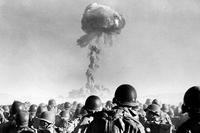
If you’ve ever heard the phrase "hurry up and wait," you know that serving in the military can be as boring as it is pulse-pounding. Sometimes a piece of entertainment can make a world of difference in the quality of life of a deployed service member. Stephen Machuga, an Army veteran, began Operation Supply Drop in 2010 to provide engaging entertainment so service members deployed overseas. After years of hard work, Operation Supply Drop is now receiving backing from big names in the video game industry including ASTRO Gaming, Rooster Teeth, Wargaming.net, and Naughty Dog. To help push their efforts, Operation Supply Drop is now running 8-Bit Salute: a 24 hour gaming marathon that will take place in May to raise funds for the charity.
Tell us about Operation Supply Drop.
Operation Supply Drop is a military gaming charity. We originally started as a care package delivery organization where we sent video games and gaming gear to soldiers deployed in combat zones. Since we started doing that, we increased our scope due to the transfer of authority in Afghanistan and the eventual end of end of combat operations there.
We’ve been working with other organizations, doing more live events in the states, visiting military hospitals, and sending care packages to soldiers recovering in warrior transition units. We’ve also been helping out with humanitarian missions in Honduras and things like that. Originally the goal was to send video games to troops in combat zones, but we’ve increased our operating scope.
As someone who’s spent time in a combat zone, I know that video gaming is a way of escape. This is my way of giving back. I know how important it was to me; gaming helped me chew through hours spent out there.
What inspired you to start sending out care packages?
Back in 2009 I was working with another charity. I got back from deployment in 2004, so I spent some time off, moved to D.C., got into the government sector, and played around there for a little bit. Then I started working for a video game website that had a charity attached to it called Extra Life; I was involved with getting video games to sick kids. I loved what they were doing, but I had no real attachment to the children’s side of things since I don’t have kids or anything like that.
When I left that organization, I still had the desire to do good, but I didn’t want to start another kids charity. I asked myself what I knew about, and the military was a no-brainer at that point. My driver from Iraq in ’03 reenlisted after getting out in ’06, and he immediately went to Afghanistan. He asked if I could reach out to my contacts within the gaming industry and see if they could send them some stuff. I figured sure, I’m here kicking it in my cozy desk job while you’re in Afghanistan, I can send out an email.
I sent out a couple emails to my gaming industry contacts. I told them about how this guy I knew from Iraq was in Afghanistan and he and 30 other guys shared a single black and white television. We got a very positive response from a game industry figure who sent us a full crate of supplies. I was not expecting that kind of feedback at all. The guy works for Activision as their public blogger, his name is Dan Amrich, and he was really the one who kickstarted things. He was the one who made me think that this was doable. Big gaming studios have closets full of stuff that they just can’t get rid of that troops would really love to get their hands on as opposed to the usual baby wipes and foot powder.
I wanted to give those guys something that would blow their minds when they opened the box. It’s an exclusive, luxury care package to a platoon of infantrymen who aren’t making assistant manager wages at McDonalds while they’re deployed downrange, shooting at people, and getting mortared every day. They absolutely deserve it. Those packages will live with them in their deployment memories forever. Period.
Do video games provide something more than just entertainment?
When I first started doing this, I was not focused on the therapeutic side at all. I just thought it was something great that the guys would love and would help them get through a tough time. As I was getting thank you letters back, troops would tell me things like: "we just lost a guy, morale is really down, we really need something to take our mind off of this. We want to throw a Call of Duty tournament, but we just have a 12 inch black and white television."
Over time I did more research about the therapeutic effect of video games and how it affected traumatic brain injuries and all of the other horrors of war. When I transitioned back myself, I had a real problem for a while. After having been deployed, I was having a bit of anxiety over just driving around from point A to point B. It would sometimes pique on trash day when everyone was putting their trash out, and my brain would immediately go back to driving up and down the Baghdad Bypass or Route Tampa, and there’d be piles of trash everywhere just waiting to blow up. It was stupid since we’re in the states, and I got that, but my brain spent a half second focusing on it.
I got home from deployment a month before World of Warcraft was released. I was out there at Walmart at six in the morning to pick up my copy when that game was released. I would go into the room I was staying at and just play. I found that I was so busy leveling up my Night Elf that I wasn’t thinking about anything from my deployment. Over weeks of gaming and getting back into the swing of things, I found that daily life got easier to deal with.
Between guys writing in and telling us that we helped them in a dark time, or that morale is low because they lost a guy or something else happened, I started digging around and found that video games are being utilized by researches to help soldiers with PTSD, trouble sleeping, night tremors, combat shakes, and things like that.
As researches are finding out, people who have PTSD or suffer from flashbacks can engage in a highly visual-spatial task which helps distract the part of their brain that gets anxious over stupid garbage. They’re so busy trying to solve puzzles and line up headshots that they’re not thinking about those other things. It completely distracts you in a way that reading a book or watching a movie can’t. In order to progress at all, you need to be paying attention. You can read a book and reread the same paragraph and have no idea what you’ve read. Video games aren’t like that. You can enter a fugue state where you’ll look up and six hours have gone by.
Researchers are finding that video games are a good way to get guys having trouble with PTSD and TBI functioning again, to get their mind off of what they’re doing. On top of being a luxury care package, we can claim that we’re helping with mental health issues. There is a lot of time to kill out there, and when Joe is bored, he’ll find really bad ways to keep himself busy; thinking about his wife at home who’s probably cheating on him, or that he doesn’t have enough money to pay his kids school bills, or whatever. Right now, on average one U.S. soldier is killing themselves every day, so keeping guys engaged is really important. We’re helping them keep sane and happy in a place where it’s really hard to do stay sane and happy. When you get the pictures back of guys smiling and holding up gear, it’s the best feeling in the world to me.
So troops in forward operating bases don’t have many utilities?
It depends. When unit A leaves, they take everything with them: all their amenities, all their televisions, and anything that’s worth a damn. When new guys get out to those bases, sometimes there’s nothing left. Even our supply drops will be taken when the service members leave. I’ll see repeat addresses sometimes and need to resupply them. I have absolutely no problem with that: they have earned it. That is there stuff and I don’t want it back.
Are the bases ready for consoles, or do you mostly send handhelds?
Consoles are ten times easier to get than handhelds. A lot of our donations are from game developers and studios, and a lot of civilian donations are 360 or PS3 games. It’s much easier to run out to Best Buy and grab a new Xbox 360 then it is donate a handheld console. The numbers just aren’t there. A handheld is for one dude, and one dude only. He is going to squirrel it away in his kit bag, bring it out at night, and no one else is going to use that. With a 360, you can get four people playing Madden and that gets a lot more use than a handheld. There have been specific incidents where we have sent out handhelds. For instance, we sent one batch to a carrier group because they don’t have electrical outlets in their quarters. We sent out handhelds and handheld games to mitigate that.
Why do service members who have experienced live fire enjoy wargames like "Battlefield" and "Call of Duty"?
It is a question for the ages – I will never understand why it works. Halo, Battlefield, Call of Duty: these are high quality games so guys are going to want to play them anyway. It just so happens that the dudes who are downrange want games where you are shooting people and this is not the first time someone has asked. Over the years, people wonder why they’re donating wargames to soldiers. But, they want shooters. There have been studies where soldiers who play violent video games sleep better through the night and don’t have night tremors. They don’t know why, but the idea is that they get the violence out of their system that they can’t any other way. Again, they’re just high quality games anyway. Every wish list we get includes a shooter, and that’s just how it goes. Guys who are actually kicking in doors and pulling triggers know that what the console presents are just games, and infantryman who aren’t part of the fight but want to be get their fix through the games. That’s the closest that I can guess as to why they want that stuff.
Do you think video games are a point of contact for veterans to reintegrate?
Absolutely, of course they are. That’s why "World of Warcraft" worked for me. If guys are playing video games before they deploy, and then they deploy downrange and they have video games in their hands and when they get back home, it’s a common thread. It’s a touchstone that they can continue day in and day out. Ten years ago, gaming was the dark arts pariah of culture. Nowadays, we’ve got "Battlefield 4" superbowl ads. You can’t sell a billion dollars worth of "Grand Theft Auto V" in 24 hours and not go, "okay, gaming is becoming what movies were back in the day." It’s becoming this medium where everybody is involved. There are video games in your phone, on Facebook, and everywhere else. Everything is gamified. Everyone likes gaming, they just don’t realize it because it has such a stigma tied to it. Of course, you can go too far with it but that’s just like anything. I’m hoping to show with Operation Supply drop that video gaming isn’t all bad. It can be a force for good.
What is the best way for individuals to get involved?
Donating is great, I love cash donations. However, we need volunteers. We need bodies. We need an army. Whenever I get someone volunteering their time, I get so excited – I think it’s amazing. For the last three and a half years, I’ve been working in a vacuum. We need evangelists. Slowly we’ve been able to put pins on the map of people who want to help. That is more exciting than a $20 donation. Everyone has talent, and everyone has a network of people who has talent. We need social media folks, website designers, and artists. I know there are individuals out there who would be more than happy to help us.
If you had to give one piece of advice to transitioning service members, what would it be?
Firstly, good luck. I was in a unique situation when I got out. I was an officer, which helped. The big thing that got me through transition was having a security clearance. I would not be here right now, period, if I had not transitioned to intelligence and had a security clearance. I have no idea what I’d be doing right now if I hadn’t done that. I’m not saying everyone should go to intelligence and get a clearance and you’ll be fine. If you don’t have a degree, use the G.I. bill, go back to school and get a degree in either finance or something computer related. If I could do college over, I would choose one of those fields.
You can volunteer for operation supply drop by emailing Stephen Machuga directly at admin@operationsupplydrop.org. Otherwise, visit their website at www.operationsupplydrop.org.




